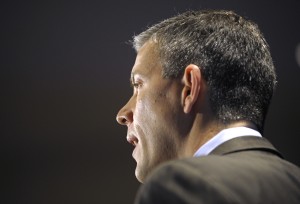
Calling No Child Left Behind a “blunt instrument” that placed more emphasis on defining failure than encouraging success, Education Secretary Arne Duncan on Feb. 12 outlined the Obama administration’s vision for rewriting the nation’s education law.
Speaking to school superintendents during the American Association of School Administrators’ National Conference on Education, Duncan identified three principles that will guide the administration’s approach toward rewriting NCLB: (1) higher standards, (2) rewarding excellence, and (3) a “smarter, tighter federal role” in ensuring that all students succeed.
“I’ll always give credit to NCLB for exposing achievement gaps and advancing standards-based reform. But better than anyone, you know [the law’s] shortcomings,” Duncan told the assembled education leaders. “NCLB allows, even encourages, states to lower their standards. In too many classrooms, it encourages teachers to narrow the curriculum. It relies too much on bubble tests in a couple of subjects. It mislabels schools, even when they are showing progress on important measures.”
He added: “NCLB required you to intervene in schools in a prescribed way, and the accountability system didn’t measure growth. It didn’t differentiate between a school in a little bit of trouble with a handful of students and a school that was in educational meltdown.”
Duncan said he and President Obama believe “we should be tight on standards … but loose about how to get there.”
States should set the bar high when establishing their academic standards, he said, adding that all students should graduate from high school “career or college-ready, without the need for remediation.”
But schools should have more flexibility in how they get all students to achieve, he said, noting: “The federal government needs to help strike the right balance between flexibility and accountability—offering support, not prescriptions.”
For chronically underperforming schools—the bottom 5 percent of all schools—“we are going to ask for rigorous change,” Duncan said. But in most schools, he said, administrators “will have more flexibility than under NCLB to improve educational outcomes.”
And the top-performing schools—which have been largely ignored until now—would receive incentives to “help lead the way to replicating academic excellence,” he said.
In striking a balance between flexibility and accountability, the administration wants to reward excellence “to encourage state and local educators to challenge themselves and hold themselves accountable,” Duncan said. “To compete in the global economy, we are going to have to fund what works, revisit conventional wisdom, and move outside comfort zones.”
In rewarding excellence, the administration seeks to shift more federal funding over to competitive grant programs instead of formula-based grants. That’s a change that worries some AASA members.
“Formula-driven funding represents a dedicated funding stream that allows school districts to appropriately plan for and invest in innovation and reform,” said the organization in a Feb. 3 statement on the president’s budget proposal. “Our members are concerned that competitive grants will have a disproportionately negative impact on small and rural districts that do not have the capacity to prepare grant applications.”
Duncan addressed these concerns directly in his Feb. 12 speech, saying: “Now, while most money will stay in formula programs under the [proposed 2011] budget—Title I and IDEA are untouched—it is true that we are shifting toward more competitive grants in some areas. But we are going to administer competitions in ways that ensure a level playing field for rural districts.”
In programs such as Invest in Innovation (I3), he said, rural districts will have a competitive advantage. In other programs, “we will be looking at set-asides for rural areas and providing technical assistance to ensure small districts can successfully compete.”
He added: “Geographic location should not dictate results.”
Duncan also addressed concerns about using data to improve instruction and define teacher quality—a key focal point of the administration’s school-reform efforts.
“I have said repeatedly—and will repeat here—that we need to use multiple measures of student achievement, not just one test score, and that better data must inform classroom instruction,” he said. “I’m much more interested in student growth and gain than absolute test scores. I want every child being challenged, not just the small percentage around that proficiency cut score.”
It’s also important for superintendents to gather data on the climate and culture of their schools, Duncan said.
Calling parental trust in their children’s schools “a leading indicator” of performance, he encouraged superintendents to survey the parents in their district.
“See what they think about how schools in their district are performing,” he said. “And ask them what the schools in your district are doing to foster a college-going culture.”
Duncan also challenged superintendents to use technology to help deliver high-quality instruction to all students.
“The tremendous potential for high-quality distance learning has yet to be really tapped,” he said, noting that only about one in five rural schools now offers distance-learning courses through satellite, television, or the internet.
He acknowledged that state and local budget shortfalls “are going to make this a brutal year in many districts.” But challenges often lead to opportunities, he said, adding: “Now is the moment to start rethinking policies that are not serving the best interests of students and teachers in the classroom.”
If your distance-learning programs are not what they should be, he said, think about what you can do to improve them. If your teacher recruitment and retention are lagging, build partnerships with area colleges. If you have a persistently low-performing school in your district, make turning around that school “the capstone of your career, not the cross you have to bear.”
In many districts, he said, “programs and policies have grown like rings on an oak tree, without any real attention paid to the return on investment [in terms of] student achievement. If … superintendents don’t address these issues now, they are likely to get worse.”
(Editor’s note: For more news from this year’s AASA conference, including a sobering wake-up call from Geoffrey Canada, CEO of the Harlem Children’s Zone, see the AASA page in our Conference Information Center.)
- Can technology help schools prevent AI-based cheating? - April 14, 2023
- How to ensure digital equity in online testing - July 6, 2022
- ‘Digital skills gap’ threatens innovation - May 30, 2022



Comments are closed.